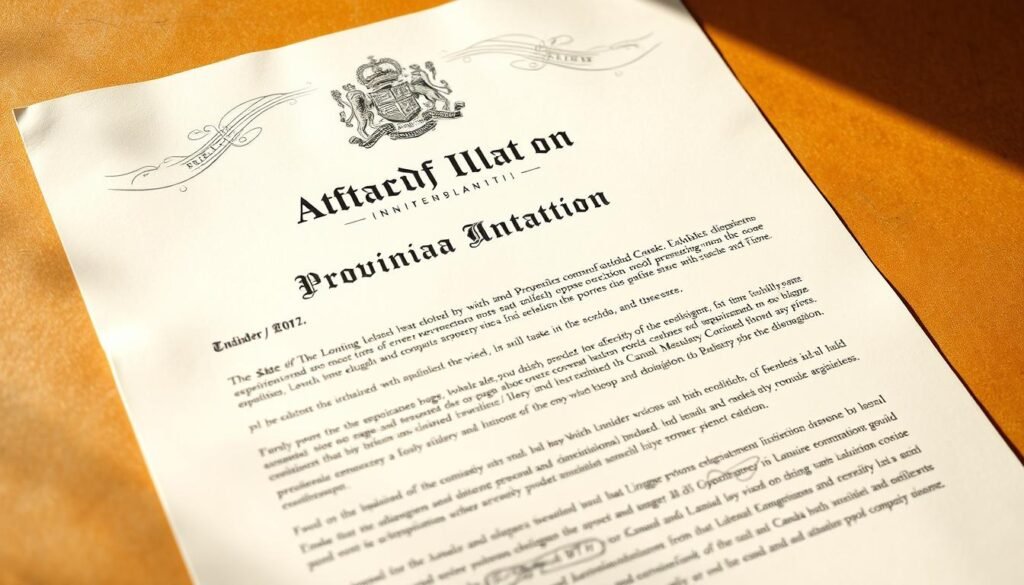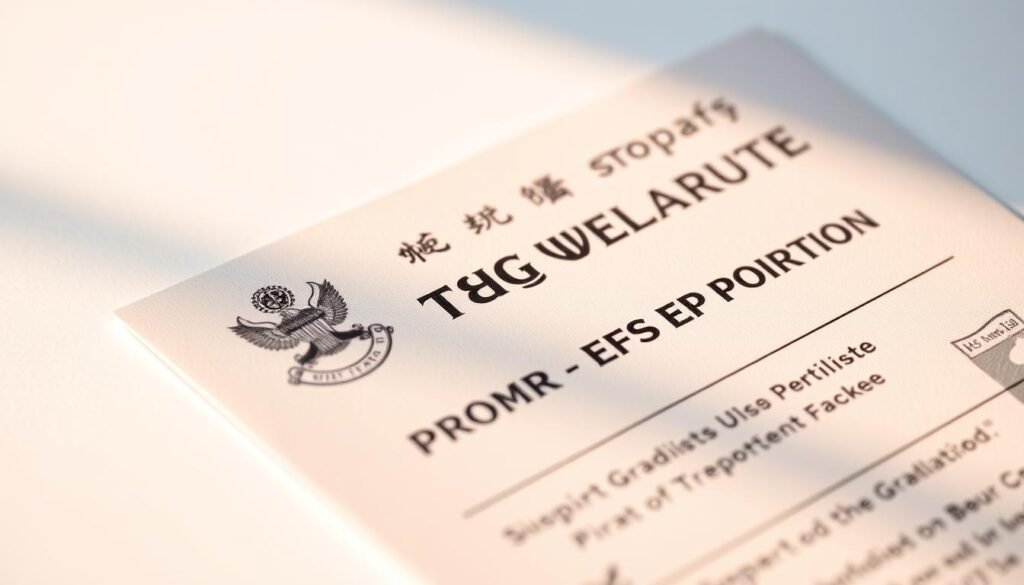Why do over 800,000 international students choose Canada as their education destination each year? The answer lies in its world-class institutions, diverse culture, and strong career opportunities after graduation. Whether you’re aiming for a degree or specialized training, Canada offers a pathway to success.
Getting a study permit is the first step for those looking to join this thriving academic community. The process includes securing a provincial attestation letter (PAL) and meeting updated 2024-2025 regulations. But with the right guidance, it’s simpler than you think.
Beyond academics, Canada provides post-graduation work permits (PGWP) and Express Entry options, making it easier to transition from student to professional. Ready to explore how you can be part of this dynamic environment?
Key Takeaways
- Canada attracts over 800,000 international students annually.
- A study permit is required, with new 2024-2025 rules in place.
- High-quality education ranks among OECD leaders.
- Post-graduation work permits (PGWP) open career pathways.
- Provincial attestation letters (PAL) are now mandatory.
Why Choose to Study in Canada?
With 31 universities ranked globally, Canada stands out as a top education hub. Its blend of academic rigor, cultural diversity, and affordability creates unmatched opportunities for learners.
High-Quality Education System
Canada’s education system shines with 3 institutions in the top 50 worldwide (QS Rankings 2024). Degrees from these colleges are recognized globally, boosting graduate employability to over 85% within six months.
Multicultural and Safe Environment
The country welcomes 200+ nationalities, offering bilingual programs in English and French. Ranked #6 in safety (Global Peace Index 2023), it’s ideal for students seeking security and inclusivity.
Affordability Compared to Other Destinations
Undergrad tuition averages $36,100 CAD—15-25% lower than the US or UK. With a weaker CAD, savings extend beyond tuition to living costs, making it a budget-friendly choice.
Step 1: Research and Select Your Program
Finding the perfect fit among Canada’s 1,500+ designated learning institutions is key. Start by mapping your career goals to programs that offer the right skills and opportunities.

Identifying Your Academic Goals
Clarify whether you seek hands-on training or theoretical expertise. Use tools like EduCanada.ca to compare programs by duration, cost, and post-graduation outcomes.
Programs under eight months won’t qualify for a PGWP. Prioritize options that align with long-term residency plans.
Exploring Designated Learning Institutions (DLIs)
Only DLIs can host international students. Verify status through IRCC’s official portal before applying.
Top-ranked institutions like U of Toronto (#21 QS) and McGill (#30) offer globally recognized degrees. Community colleges, like Sheridan, excel in co-op placements.
- Provincial differences: Quebec’s CEGEP system requires extra steps for university admission.
- Co-op programs blend coursework with paid experience—ideal for fields like engineering.
- Check PGWP eligibility; some programs or schools are excluded.
Step 2: Apply to a Canadian Institution
Your journey to a Canadian education begins with a strong application. Each institution sets unique criteria, so thorough preparation is key to success.
Understanding Admission Requirements
Most schools require IELTS 6.0+ or TEF CLB7+ for language proficiency. A minimum GPA of 3.0 is typical for undergraduate programs.
Some provinces, like Quebec, need additional steps such as a CAQ. Always check your institution’s website for specifics.
Obtaining a Letter of Acceptance
A letter acceptance confirms your spot and is mandatory for a study permit. Submit transcripts, language test results, and references to secure it.
Unconditional letters mean you’ve met all requirements. Conditional ones may require further exams or coursework.
- Student Direct Stream (SDS): Pay full tuition and a $20,635 CAD GIC for 20-day processing.
- Apply 6-12 months before your program starts to avoid delays.
- Provincial attestation letters (PAL) are now required for most applicants.
Step 3: Secure a Provincial Attestation Letter (PAL)
A new requirement for 2024 applicants adds an extra step to the process. The provincial attestation letter (PAL) is now mandatory for most study permit applications. This document confirms your spot under Canada’s 360,000 permit cap for 2024.

What Is a PAL and Why Is It Required?
The PAL ensures fair distribution of permits across provinces and territories. Each region gets allocations based on population and existing student numbers. Exemptions apply for master’s/PhD candidates, K-12 students, and permit renewals.
How to Obtain a PAL from Your Province
Processing times vary—typically 2–8 weeks. Submit these documents:
- Letter of acceptance (LOA) from a designated learning institution
- Passport copy and proof of funds
Quebec uses its own process (CAQ). Apply early if targeting competitive provinces like Ontario or British Columbia.
Step 4: Apply for a Study Permit
Securing your study permit is a crucial step toward beginning your academic journey. This document allows you to stay legally while pursuing your education. The process involves meeting eligibility criteria, gathering required documents, and understanding processing timelines.
Study Permit Eligibility Criteria
To apply study permit, you must prove acceptance at a designated learning institution (DLI). You’ll also need proof financial support—$20,635 CAD plus tuition fees for non-Quebec applicants. Additional requirements include a clean criminal record and medical exams if applicable.
Required Documents for Your Application
Prepare these required documents:
- Provincial Attestation Letter (PAL)
- Letter of Acceptance (LOA) from a DLI
- Valid passport and passport-sized photos
- Proof of funds (bank statements or scholarship letters)
Biometrics ($85 CAD) are mandatory for applicants from 14+ countries. Spouses may qualify for an open work permit.
Processing Times and Fees
Standard processing takes 16+ weeks, but the Student Direct Stream (SDS) reduces it to 12 weeks for eligible applicants. Fees include $150 CAD for the permit and $85 CAD for biometrics. Expedited options are available for urgent cases.
Understanding Canada’s Study Permit Cap (2024-2025)
Canada’s new study permit cap introduces significant changes for 2024-2025 applicants. The government reduced permits by 35%, allocating just 360,000 spots nationwide. This policy aims to balance educational demand with housing and resource availability.
Impact on International Students
Provinces now receive fixed quotas, with Ontario (55%), British Columbia (20%), and Quebec (10%) absorbing most applications. Competitive regions may require early submissions—DLIs must prove adequate housing to host international students canada.
Smaller provinces like Manitoba offer faster processing. Regional institutions outside major cities often have unused quota space, making them strategic alternatives.
Exceptions to the Cap
Master’s, PhD, and K-12 applicants are exempt from the study permit cap. Permit renewals and current holders also avoid restrictions. These exceptions prioritize advanced research and long-term academic commitments.
IRCC’s 2025 expansion will include graduate students, reflecting Canada’s focus on retaining high-skilled talent. Always verify eligibility through official channels before applying.
Financing Your Education in Canada
Managing education costs is a top concern for students planning their academic journey. From tuition fees to daily necessities, a solid financial plan ensures you can focus on learning without stress.
Tuition Fees and Living Expenses
Costs vary by province and program. Undergraduate tuition fees average $36,100 CAD yearly, but Quebec requires proof of $15,078 CAD for single students.
Living expenses differ too. Vancouver’s rent is 30% higher than Montreal’s. Budget for groceries, transport, and health insurance separately.
Proof of Financial Support Requirements
You must show funds for tuition and living costs. Acceptable proof includes:
- Bank statements showing $20,635 CAD (non-Quebec)
- Guaranteed Investment Certificate (GIC)
- Sponsor letters with notarized support pledges
Scholarships and Work Opportunities
EduCanada lists 1,200+ scholarships, including prestigious Vanier and Trudeau awards. Graduate assistantships offer stipends and research experience.
Work opportunities include 20 hours/week off-campus and unlimited on-campus jobs. Co-op programs blend paid work with study, ideal for gaining industry experience.
Working While Studying in Canada
Balancing work and academics can enhance your experience as a student. Canada offers flexible work opportunities, allowing you to earn income and gain skills. Understanding the rules ensures compliance with your study permit conditions.

On-Campus and Off-Campus Work Rules
You can work up to 20 hours per week during academic terms. Full-time hours are permitted during scheduled breaks. A Social Insurance Number (SIN) is required for employment.
Language program attendees are ineligible for off-campus jobs. Always verify your study permit for work restrictions.
Co-Op and Internship Work Permits
Mandatory co-op programs require a separate work permit. The internship must be under 50% of your program duration. STEM fields often offer paid placements with industry partners.
Plan early—processing takes 4–6 weeks. These roles can bridge to a post-graduation work permit.
- Taxes: File annual returns if you earn over $14,000 CAD.
- SIN Application: Submit via Service Canada with your permit and passport.
- Program Restrictions: Check eligibility before accepting internships.
Preparing for Life in Canada
Settling into a new country requires smart planning for housing and healthcare. Understanding local systems helps you focus on academics while staying comfortable. These essentials make your transition smoother from day one.
Finding the Right Accommodation
Average rents range from $800–$1,500 CAD monthly. Homestays offer cultural immersion, while campus residences provide convenience. Private rentals give independence but require leases and utility setups.
Compare locations near your institution. Some provinces like Quebec have lower costs than Ontario. Always inspect units personally or via verified virtual tours.
Health Coverage Essentials
Health insurance is mandatory in BC, Manitoba, Ontario, and Quebec. British Columbia imposes a 3-month waiting period for MSP coverage. Temporary private plans bridge this gap affordably.
International student packages often include dental and vision. Keep policy documents handy for clinic visits. Pharmacies require separate prescription coverage.
Setting Up Essential Services
- Bank accounts: Major banks offer student packages with no fees
- Winter gear: Invest in quality jackets (-30°C rated) and waterproof boots
- Cultural resources: Campus international offices host orientation events
Post-Graduation Opportunities
Completing your education opens doors to valuable career and residency options. Canada offers structured pathways to help graduates build professional experience and settle long-term.

Post-Graduation Work Permit (PGWP)
The post-graduation work permit lets you work for 8 months to 3 years, depending on your program length. STEM and healthcare graduates often qualify for the maximum duration.
Eligibility requires:
- Completion of an 8+ month program at a designated learning institution
- Application within 180 days of graduation
- Full-time enrollment during final academic terms
Spouses may apply for open work permits during your PGWP period. This flexibility supports household stability while you gain experience.
Pathways to Permanent Residence
Canadian education boosts your permanent residence applications. Express Entry awards 50+ CRS points for degrees earned locally.
Key immigration programs include:
- Provincial Nominee Programs (PNP): BC PNP Tech prioritizes IT and engineering grads.
- Canadian Experience Class: 1 year of skilled work under PGWP qualifies you.
- Quebec Experience Program (PEQ): French proficiency fast-tracks applications.
These options create a seamless transition from student to resident, leveraging your Canadian credentials.
Conclusion
Navigating the process to pursue education abroad involves careful planning. Follow these key steps: research programs, secure acceptance, obtain a provincial attestation letter, and apply for your permit. Each phase has specific timelines—start early to meet 2024’s reduced quotas.
Before submitting, double-check your documents: PAL, financial proofs, and a valid passport. Use official resources like EduCanada.ca or the IRCC portal for updates. Professional consultants can streamline complex cases.
With proper preparation, you’ll join over 800,000 international students thriving in a diverse academic environment. Take action today to turn your goals into reality.
FAQ
What is a Designated Learning Institution (DLI)?
A DLI is a school approved by a Canadian provincial or territorial government to host international students. Only DLIs can issue a Letter of Acceptance, which is required for a study permit.
How do I get a Provincial Attestation Letter (PAL)?
After receiving your Letter of Acceptance, you must apply for a PAL through the province or territory where your institution is located. Each region has its own process.
What financial proof do I need for a study permit?
You must show funds to cover tuition fees, living expenses, and return transportation. As of 2024, this is typically CAD ,635 per year, plus tuition.
Can I work while studying in Canada?
Yes. Most students can work up to 20 hours per week off-campus during semesters and full-time during scheduled breaks. Some programs also allow co-op work permits.
Is there a cap on study permits in 2024?
Yes. Canada has set a limit of 360,000 approved study permits for 2024–2025. Master’s, PhD, and primary/secondary school applicants are exempt.
What’s the processing time for a study permit?
Processing times vary by country but typically range from 8 to 16 weeks. Apply early and ensure all documents (PAL, acceptance letter, financial proof) are included.
Can I stay in Canada after graduation?
Yes. The Post-Graduation Work Permit (PGWP) lets you work for up to 3 years. This experience may help you qualify for permanent residence through programs like Express Entry.
Do I need health insurance as an international student?
Yes. Some provinces (e.g., British Columbia, Alberta) provide coverage, while others require private insurance. Check your institution’s requirements.






